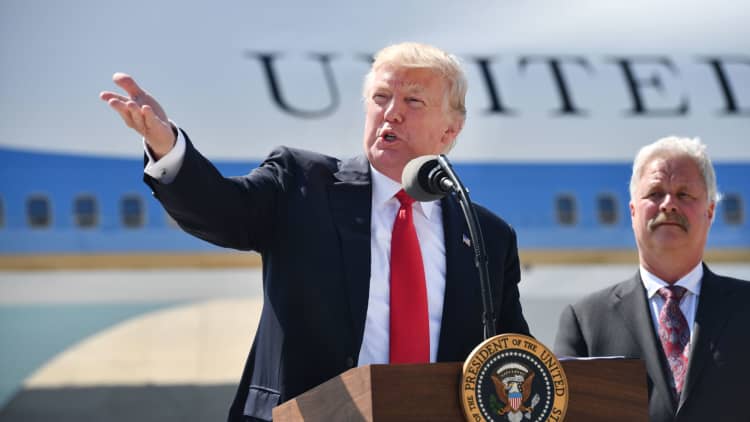The kids are alright — or at least doing a lot better — under Obamacare.
A leading children's welfare group on Tuesday urged state and federal policymakers to continue investing in programs that improve kids health, including Obamacare, whose expansion led to a sharp decrease in the number of kids without health insurance from 2010 through 2015.
In 2010, about 8 percent of the children in the United States, or 5.9 million kids, lacked health insurance, the Annie E. Casey Foundation's new Kids Count data book says.
But over the next five years, as Obamacare was fully implemented, there was more than a 37 percent reduction in the number of children without insurance.
By 2015, about 5 percent of kids, or 3.5 million lacked insurance, the Kids Count report says.
The report said that eight years after a massive recession, fewer kids overall live in poverty, more parents have a job, and more families are able to afford housing.
But, "Of the child health trends tracked by Kids Count, the most remarkable is the tremendous increase in health insurance coverage; 95 percent of American children now have health insurance," the report says. "The drop in the number of uninsured children is largely attributed to expanded public health coverage."

The state with the most children, California, also saw the most improvement, according to the report.
California, which is home to 1 out of every 8 American kids, had a 67 percent decline in the number of uninsured children in the five-year span.
Other big gainers were Colorado, Minnesota, Nevada, New Mexico, New York, Oregon and South Carolina. Each of those states had declines of more than 50 percent in the number of their uninsured children.
The report comes as the Republican-controlled Congress continues efforts to pass a bill that would repeal and replace key parts of the Affordable Care Act, the more formal name of Obamacare. The House's version of that bill, which passed by just a single "yes" vote, is projected by the Congressional Budget Office to lead to 23 million more uninsured Americans by 2026 if it becomes law than would be the case if the ACA remains intact.
Laura Speer, associate director of policy reform and advocacy at the foundation, noted during an interview with CNBC that the uninsured rate of American kids was as high as 15 percent in 1997.
But that year the rate began falling after implementation of the Children's Health Insurance Program, or CHIP, which provides low-cost coverage to children in families that earn too much money to qualify for Medicaid, the government-run health coverage program for primarily poor people. CHIP covers kids in low-income and middle-income families.
"Since the ACA was in place, the rates of uninsured kids have gone down even more," Speer said.
She said that is not surprising, because the ACA led to significant gains in health insurance coverage for adults since 2010.
"What most people have seen is that ... when parents have access to health insurance that kids are more likely to have health insurance," Speer said.
Obamacare expanded coverage in two main ways: through allowing states to loosen their eligibility requirements for Medicaid to cover nearly all poor adults, and in authorizing the creation of government-run exchanges that sell subsidized private health insurance plans.
Speer said the expansion of health insurance to kids has a positive economic benefit to society because it gives children access to preventative care that can keep them healthy, and reduce the needs of parents to "miss work or not be able to keep their job" while they take care of a sick child.
"If your kids get sick and if you don't have health insurance, being able to pay those bills, particularly if you're in a low-wage job, it becomes devastating for families," Speer said.
She said that although the uninsured rate of 5 percent among kids "should be zero ... we should be proud" of the reduction in the rate in recent years.
"Rolling back any of that is a real problem for kids," Speer said.
Watch: Trump promises better health care



